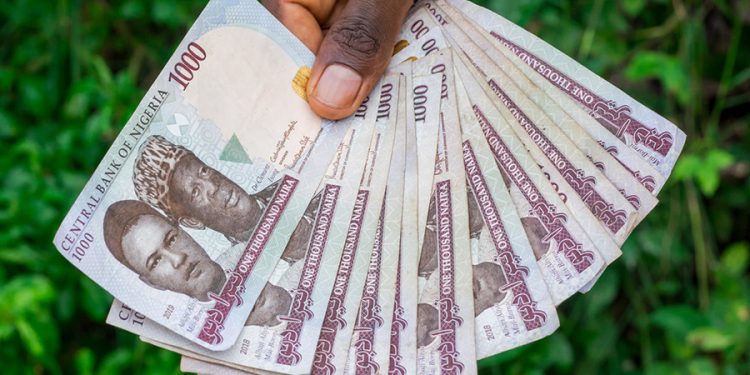Why is the Naira falling?
The Nigerian economy is facing a massive foreign exchange crisis and the rate of depreciation of the naira has sparked serious concern among citizens.
Since the Central Bank of Nigeria (CBN) banned sales of foreign exchange to Bureau de Change (BDC) operators, we have seen the parallel market exchange rate depreciate from N505/$1 to N570/$1 at the black market. The last time the exchange rate depreciated this quickly was in early 2017, when the rate jumped from around N450 to over N500 to the dollar. After the Central Bank implemented a policy to bring liquidity into the economy, it then evened out at around N365/$1.
However, during the last Monetary Policy Committee (MPC) meeting, the CBN Governor, Godwin Emefiele, stated that the apex bank would not return to selling foreign exchange to BDCs. Emefiele said this while responding to a question on his views about BDCs.
He said, “Nigeria was the only country where the Central bank sells [sic] foreign exchange from their reserves to the BDC operators. The question we ask ourselves is why it took us so long to ban their operation.”
Emefiele also warned about the impact of foreign exchange speculators only interested in making profits at the expense of the Nigerian economy.
Nairametrics spoke to some analysts to get their views on the prevailing currency conundrum bedevilling the nation.
What are the analysts saying?
Some of our analysts believe that speculators are inflating prices to force the Central Bank to intervene. A speculative move known as “pump and dump” may be one of the main reasons why bidders will be willing to pay any price to buy dollars. The move simply entails hiking the currency rate until those who have placed significant holdings exit just before the crash.
Attacks on currencies are nothing new in the globe and can be seen as borrowing a leaf from George Soros’ famous attack on the UK Pounds in 1992.
Dumebi Udegbunam, Fixed Income trader at United Bank for Africa (UBA) postulated that the depreciation of the naira was heavily based on forces of demand and supply. He noted that currently, the demand for dollars outweighs its supply, giving room for hoarders and speculators to take advantage, hence the sporadic increase to a 48-year high in the exchange rate at the parallel market.
“With a population of over a 200 million in Nigeria, it will be shocking for you to know that there is an over 60% dollar element in a large number of our consumer goods which is set to increase more as seen in the new trade data released by the National Bureau of Statistics (NBS). Nigeria recorded a trade deficit of ₦1.9 trillion in Q2-2021. This simply shows an unfavourable balance of payment position (our imports more than our exports) i.e. as net importers, we are giving out more dollars than we are receiving.
“Other demand pressures include an increase in education FX outflows as that has increased from $500 million in 2015 to $6 billion in 2021, showing a massive growth in demand for dollars over a 6 year period,” he explained, establishing also that the lack of liquidity in the market was causing the naira’s downfall.
“With the country being highly import-dependent, there isn’t enough dollars to match our growing demand. Let’s look at our capital importation figures. Our capital imports fell to $875.62 million in Q2 2021 from $1.91 billion in Q1-2021. In 2020, capital importation dropped by 59.65% from $23.9 billion to $9.68 billion (lowest in 4 years) showing a drop in dollar supply.
“Other supply shortages include drop-in remittance. Diaspora remittances to Sub-Saharan Africa declined by an estimated 12.5% in 2020 to $42 billion, almost entirely due to a 27.7% decline to Nigeria, which accounts for over 40% of such flows to the region. So, if you put this all together you can see that we are facing a serious supply shortage in dollars and quantum growth in the demand,” he said.
Read: Kenya seeks IMF aid to repay China loans
When probed about his views on CBN BDC debacle, Udegbunam stated that banning FX sale to BDCs was definitely the right way to go but raised concerns about the ability of the bank to accommodate all the demand fallouts of the ban, especially from the informal sector whose business needs for dollars have increased immensely.
“Do the bureaucratic and documentation processes to get dollars from the banks help businesses or investors who are constantly faced with time value on investment, i.e. faster disbursement of dollars to help improve their efficiency? In a nutshell, with the stoppage of supply of dollars to BDCs, the CBN has to come up with more flexible policies and guidelines to accommodate the versatile demand and encourage a positive shift of customers from patronizing BDCs to banks, which will help us achieve a rate convergence in the long term.
“There is little or nothing an average Nigerian can do to help against the depreciation of the naira. However, there is a need for us as a country to focus on strong backward integration programmes tailored towards curbing import pressures where we can actively manufacture through the whole value chain. Again, recovery from an exchange rate crisis can only be through diversification of the economy and policy changes,” he opined.
Dr Omobola Adu, a Research Analyst at GDL, agreed that the BDC ban and also speculative activities by individuals were catalysing the naira’s depreciation at the black market, noting that a similar thing happened in 2016 when the CBN also stopped sales of FX to BDCs. He was, however, against a return to the status quo where the apex bank funds BDCs, as it is not a long-run fix.
“Going back to using BDCs will not solve anything in the long run. We need to create a functional system that can counterbalance the demand and limited supply of FX in the country. This will happen when our economy is competitive and businesses are encouraged to produce goods that are currently being imported,” he said.
He warned that the naira might fall further, due to the overwhelming pressure on the currency, stating that:
“We should expect further depreciation. Looking at the current account deficit shows us that we consume beyond our means and they will need to borrow to plug the gap leading to further decline in our foreign assets and consequently, more pressure on our currency.”
When probed on how Nigeria can safeguard itself from impending doom, he said, “The only way the average Nigerian can safeguard against the falling Naira value is to invest in dollar assets. There are several mutual funds today that offer the opportunity for retail investors to invest and earn returns in dollars.”
Isaac Jacob Omosimua, CFO of Crichweather International limited, stated the CBN’s ban on FX sale to BDCs had aggravated the FX supply shortage. Omosimua argued that the apex bank should have considered the fragility of the Nigerian economy and ensured the availability and easy accessibility to foreign currencies in commercial banks before enacting the ban on FX sales to BDCs.
“This is because the interaction between the supply and demand for FX determines the exchange rate in a flexible system. The wide gap between the official and black-market rates which strengthens black market activities can also be checked by this strategy,” he stated, further opining that the CBN should reverse its policy since it could not satisfy the demand using that system.
“The discontinued supply of FX to the BDCs has no doubt created unhealthy gaps in supply and demand. While the intentions of the apex bank remain genuine, in my opinion, making FX readily available should be the topmost priority, considering the nature of the economy. I mean, if the apex bank cannot meet the demands of the people, why not go back to using BDCs in the meantime to avoid economic harm while working on the quality of the financial institution by going back to the drawing board?” he said.
He also believed that the naira would fall further, noting that this would automatically translate to a further rise in the prices of goods and services, and a further fall in the real value of the money we save in Naira.
Bottomline
Alma Oputa, Managing Partner at Avant-Garde Capital Ltd commented on a solution to the falling Naira.
In her opinion, “the federal government should strive to make Nigeria very attractive to foreign investors to come in. Somehow, they keep doing the opposite and chasing away the few foreign investors we have here.”








